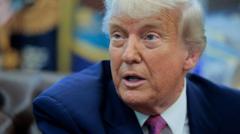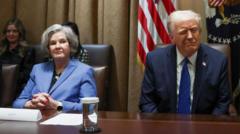US President Donald Trump has publicly confronted Vladimir Putin's approach to the ongoing war in Ukraine, issuing a two-week ultimatum to ascertain the Russian leader's true intentions.
**Trump Sets Two-Week Ultimatum for Putin Amid Ukraine Crisis**

**Trump Sets Two-Week Ultimatum for Putin Amid Ukraine Crisis**
In a significant escalation of rhetoric, Trump challenges Putin to clarify intentions on Ukraine within two weeks.
In the Oval Office, Trump voiced his frustration during a press conference, suggesting that clarity on whether Putin is "tapping us along" would emerge within two weeks. He voiced skepticism about Putin's desire to end the conflict as Ukraine faces intensified Russian assaults, including strikes that resulted in civilian deaths in Kyiv. Trump’s remarks reflect escalating concern over Russia’s increasing military activity, which includes gruesome bombardments that have sparked calls for a more robust American response.
Trump's past communications with Putin included a two-hour discussion that, according to Trump, ended on positive terms. However, Moscow's subsequent actions, including missile and drone strikes on Ukraine, countered that optimism, raising doubts about the efficacy of Trump’s past threats. Although he maintains a public hardline stance, Trump has historically softened his demands while seeking a diplomatic solution. This shift has raised questions about his influence, particularly as he tones down critiques of the Kremlin in exchange for discussions of peace.
The Kremlin's response has highlighted a disconnect, as its aide commented on Trump's lack of understanding regarding the complexities of the situation. Meanwhile, the Biden administration stays firm with existing sanctions against Russia but faces continued criticism for its perceived inability to rein in Putin’s aggression. As the conflict endures with significant human and territorial cost, both Ukraine and the international community watch closely how this latest rhetorical battle unfolds.
With Germany now assisting Ukraine in enhancing its military capabilities, the stakes continue to rise. Trump's shifting strategy regarding diplomacy and military actions underscores the precarious balance of power as NATO allies grapple with the ongoing crisis.
Trump's past communications with Putin included a two-hour discussion that, according to Trump, ended on positive terms. However, Moscow's subsequent actions, including missile and drone strikes on Ukraine, countered that optimism, raising doubts about the efficacy of Trump’s past threats. Although he maintains a public hardline stance, Trump has historically softened his demands while seeking a diplomatic solution. This shift has raised questions about his influence, particularly as he tones down critiques of the Kremlin in exchange for discussions of peace.
The Kremlin's response has highlighted a disconnect, as its aide commented on Trump's lack of understanding regarding the complexities of the situation. Meanwhile, the Biden administration stays firm with existing sanctions against Russia but faces continued criticism for its perceived inability to rein in Putin’s aggression. As the conflict endures with significant human and territorial cost, both Ukraine and the international community watch closely how this latest rhetorical battle unfolds.
With Germany now assisting Ukraine in enhancing its military capabilities, the stakes continue to rise. Trump's shifting strategy regarding diplomacy and military actions underscores the precarious balance of power as NATO allies grapple with the ongoing crisis.




















